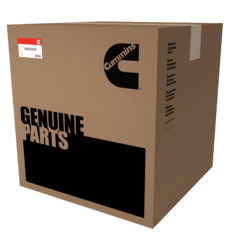This truck part is made by Cummins®. We guarantee that all of our parts are from the OEM (original equipment manufacturer), ensuring a proper fit and quality manufacturing.
We honor the warranty provided by the original equipment manufacturer.
Introduction
The Cummins 3666051 Smoke Chart is a specialized tool designed to assist in the maintenance and operation of commercial trucks. It serves as a diagnostic aid, providing insights into the engine’s combustion efficiency and overall health. By interpreting smoke opacity levels, technicians can identify potential issues early, ensuring optimal engine performance and longevity 1.
Basic Concepts of Smoke Charts
A smoke chart is a visual reference tool used to assess the opacity of exhaust smoke emitted by an engine. It functions by comparing the observed smoke density against a standardized chart, which correlates smoke opacity with specific engine conditions. The principles behind smoke opacity involve the measurement of light transmission through the exhaust smoke, where higher opacity indicates incomplete combustion and potential engine issues 2.
Purpose of the Cummins 3666051 Smoke Chart
This Cummins part plays a role in the operation and maintenance of trucks by aiding in the identification of issues related to fuel combustion and engine efficiency. It provides a straightforward method for technicians to evaluate the engine’s performance based on the visual characteristics of the exhaust smoke, facilitating timely interventions and maintenance actions 3.
Key Features
The Cummins 3666051 Smoke Chart is characterized by its durable design and precise calibration. It is constructed from high-quality materials to ensure reliability and longevity. Unique attributes include its ease of use, clear visual indicators, and compatibility with a wide range of engine types, making it a versatile tool in the maintenance toolkit.
Benefits of Using the Cummins 3666051 Smoke Chart
Incorporating this part into regular maintenance routines offers several advantages. It contributes to improved engine performance by enabling early detection of combustion inefficiencies. Additionally, it enhances fuel efficiency and can lead to cost savings by preventing minor issues from escalating into major repairs.
Troubleshooting and Maintenance Suggestions
To effectively use the smoke chart for troubleshooting, technicians should conduct regular smoke tests under controlled conditions. Maintenance practices to ensure the accuracy and longevity of the smoke chart include keeping it clean and stored in a dry place, and periodically verifying its calibration against known standards.
Interpretation of Smoke Opacity Levels
Understanding the different levels of smoke opacity is crucial for diagnostic purposes. Lower opacity levels generally indicate efficient combustion, while higher levels may signal issues such as fuel injection problems, air intake restrictions, or combustion inefficiencies. This information can guide technicians in making informed decisions about necessary repairs or adjustments.
Common Engine Issues Detected by Smoke Charts
Smoke charts can identify a variety of engine problems, including fuel injection issues, air intake problems, and combustion inefficiencies. By analyzing the color and density of the exhaust smoke, technicians can pinpoint specific areas of concern, such as clogged fuel injectors or malfunctioning air filters, and take appropriate action to resolve these issues.
Integration with Other Diagnostic Tools
The Cummins 3666051 Smoke Chart can be used in conjunction with other diagnostic tools to provide a comprehensive assessment of engine health. When combined with electronic diagnostic systems and performance data, it offers a more complete picture of the engine’s condition, enabling more accurate diagnoses and effective maintenance strategies.
Historical Context and Evolution of Smoke Charts
Smoke charts have been used in the automotive industry for decades, evolving alongside advancements in engine technology. The development of the Cummins 3666051 reflects a commitment to improving diagnostic accuracy and ease of use, building on the foundational principles of smoke opacity measurement to meet the demands of modern commercial truck engines.
Cummins: A Brief Overview
Cummins Inc. is a global leader in the design, manufacture, and distribution of engines and related technologies. With a history spanning over a century, Cummins has established itself as a trusted provider of innovative and reliable engine solutions for the commercial truck industry. The company’s dedication to quality and innovation is evident in its product range, which includes a variety of engines designed to meet the diverse needs of commercial transportation.
Conclusion
The Cummins 3666051 Smoke Chart is an invaluable tool for maintaining and diagnosing commercial truck engines. Its ability to provide clear insights into engine health through the analysis of smoke opacity makes it a critical component in the maintenance toolkit. By integrating this part with other diagnostic tools and adhering to regular maintenance practices, technicians can ensure optimal engine performance, enhance fuel efficiency, and contribute to the longevity of commercial truck engines.
-
Shashank Arora, Alireza Tashakori Abkenar, and Shantha Gamini Jayasi, Heavyduty Electric Vehicles: From Concept to Reality (Elsevier, 2021).
↩ -
Pedram Asef, Sanjeevikumar Padmanaban, and Andrew Lapthorn, Modern Automotive Electrical Systems (Wiley, 2022).
↩ -
Klaus Mollenhauer and Helmut Tschoeke, Handbook of Diesel Engines (Springer, 2010).
↩
SPECIFICATIONS
RECOMMENDED PARTS
* Variable geometry turbocharger and electronic actuator repairs are not eligible to be claimed as over-the-counter under New or ReCon parts warranty for parts installed after October 1, 2018.
* Diesel Oxidation Catalyst (DOC), Diesel Particulate Filter (DPF), Selective Catalyst Reduction (SCR) catalyst, and Electronic Control Module (ECM) repairs are not eligible to be claimed as over-the-counter under New or ReCon parts warranty for parts installed after January 1, 2020.
* These restrictions are only applicable to New parts and ReCon parts coverages for the components listed above sold to a customer in the US or Canada. All other coverages are excluded. All other regions are excluded.

